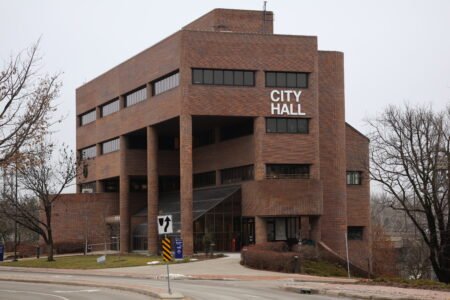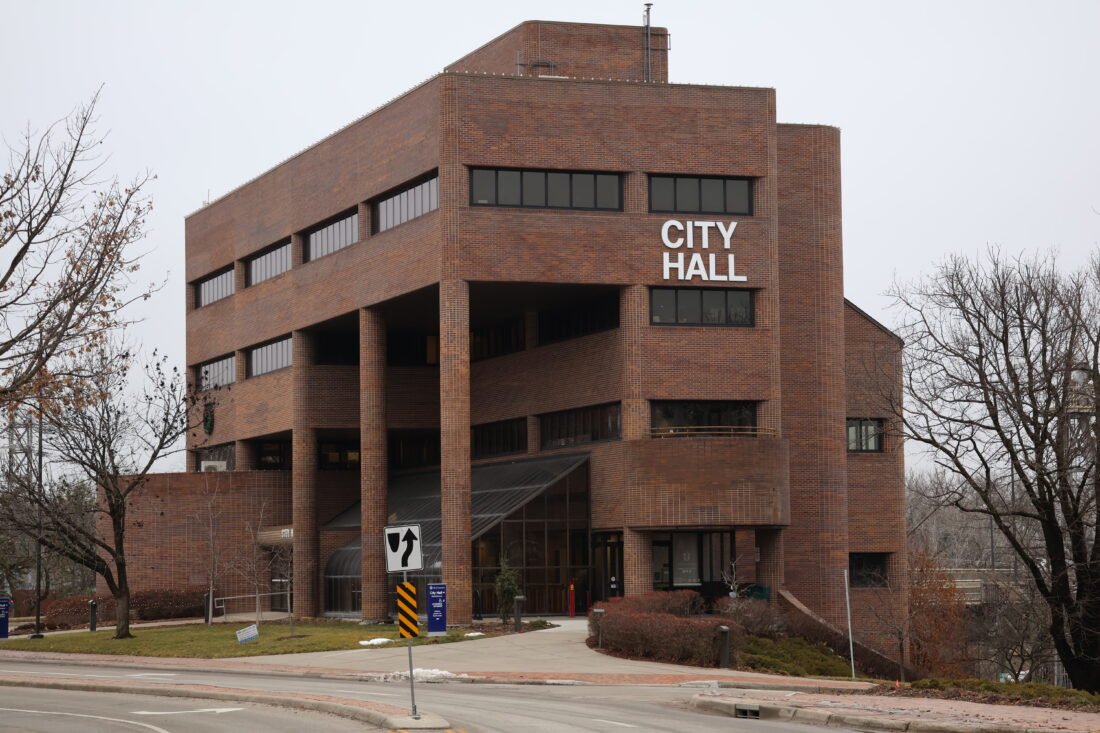
photo by: Chris Conde/Journal-World
Lawrence City Hall
Lawrence city commissioners are being asked to approve the city’s largest property tax rate increase in at least 50 years to help fund everything from increased sidewalk maintenance to raises for city employees.
But a Journal-World review of the proposed 2025 City of Lawrence budget found that the majority of the money from the tax increase wouldn’t go to those projects or any other such initiative.
Instead, the review found that nearly 65% of the money that would be generated by the property tax rate increase would be used to bolster the city’s equivalent of a rainy day savings account that is projected to have about $27 million in it by the end of 2025.
City Manager Craig Owens’ recommended budget would increase the city’s general fund balance account — a type of reserve account to be used in the case of downturns or emergencies — by $3.44 million in 2025. In an interview with the Journal-World, Owens acknowledged the tax increase is helping funding the $3.44 million boost, but said rebuilding that fund balance account should be an important community priority because it provides protection against potentially serious unforeseen events.
“We are trying to stay at 90 (days,) and we are trying to build that back gradually,” Owens said. “I think that is the responsible thing to do.”
Here’s the basic math of what is happening in the proposed budget as it relates to the general fund balance account: The city’s general operating fund is budgeted to collect $119.7 million in revenues and spend $116.2 million. The difference of $3,443,000 is what the city will use to build up its general fund balance account. Of the $119 million in revenues, about $5.3 million will come from a property tax rate increase of 3.5 mills that will be paid by homeowners, businesses and other property owners across the city. The $3.4 million that the fund balance savings account is projected to grow by is 64% of the total $5.3 million tax rate increase.
If city officials were willing to let the fund balance savings account hold steady — meaning it would finish 2025 with about $23.6 million — the city could reduce the property tax rate increase to about 1.25 mills and still accomplish the sidewalk maintenance, the city raises and everything else that is proposed in the recommended budget.
Property owners across the city still would be facing higher property tax bills, but the increases would be about 65% less than what they would be under the proposed budget. The owner of a $300,000 home would see a tax increase of about $120 as the result of a 3.5 mill property tax rate increase. That same owner would see about a $43 increase if the property tax rate increase were 1.25 mills.
Owens said he was intentional about increasing the city’s fund balance amount because he has been concerned at how the city’s budget has functioned during relatively good economic times, which has him worried about what might happen during a downturn.
“As I forecast what is ahead, I feel like we need to be prepared to for economic downturns,” Owens said. “It is responsible to build our minimum reserve requirements back.”
Owens said that philosophy is particularly important now as the city has dipped into its fund balance account in the past to fund shortfalls. The city is expected to finish 2024 with a $23.6 million balance in its general operating fund balance account, down from $25.6 million at the end of 2023.
Figuring out how much money is the right amount to keep in a rainy day account is not a science. The city, however, does have an official policy that guides such decisions. The Journal-World reviewed that policy and found it supports Owens’ decision to recommend an increase in the fund balance amount. But to complicate matters, the policy also would support a decision by the City Commission to disregard Owens’ recommendation to increase the fund balance.
The first part of the fund balance policy, adopted in 2021, states the city’s policy is to have a fund balance amount “equal to 90 days of operating expenditures.” It explicitly states that “proposed budgets or budget revisions, will maintain this level of reserve.”
That language indicates that, if anything, Owens didn’t technically go far enough in boosting the city’s fund balance. His recommendation would create a fund balance equal to 84 days of operating expenditures.
The second part of the fund balance policy, however, states that the city is only obligated to begin building up its fund balance account if it falls below 60 days of operating expenditures. In other words, the city manager is obligated to proposed 90 days, but the City Commission would still be in compliance with the policy as long it doesn’t let the account fall below 60 days.
If city commissioners rejected Owens’ recommendation to boost the fund balance account in 2025, the account would still have 74 days of operating expenditures on hand, according to the city’s budget figures.
In one sense, city commissioners will have to decide whether having 10 extra days of operating cash on hand is worth the approximately 2 mill property tax rate increase that would be required to boost the fund balance account.
Commissioners will be the ultimate deciders of that question. They have full discretion to change or modify Owens’ budget recommendations. The commission is expected to debate the budget through late August before giving it final approval.
Other questions about the city’s fund balance amounts may emerge, however. The general fund balance is just one of several fund balance savings accounts that the city maintains. The city has a policy for those other fund balance accounts, which generally are savings accounts for more specific functions, such as street maintenance, parks and recreation or other such functions.
The fund balance policy for those specific accounts calls for a fund balance amount “equal to 60 days of operating expenditures.” The Journal-World’s review of the 2025 recommended budget raises questions of whether 10 accounts are in violation of the city’s policies, in some cases by millions of dollars.
The Journal-World looked at 11 special revenue accounts and found that 10 of them had balances greater than 60 days of operating expenses. The city’s equipment reserve fund has the equivalent of 1,091 days of operating expenses in its account. That equates to $2.9 million over and above what the policy calls for.
The largest overage in terms of dollar amount is in the city’s debt service fund, which is used to make bond payments for a variety of city projects. That account has $22.8 million above what the policy calls for, checking in with 198 days of operating expenses in its account.
Owens, in an interview with the Journal-World, adamantly disagreed that the accounts are out of compliance with the city’s policy. Owens said the policy does not place a maximum on how much the city can accumulate in fund balance amounts. Instead, he contends, the policy only sets a minimum level.
The Journal-World, however, noted in the interview that the actual language of the policy does not back up that contention. The policy does not include any language such as “at least 60 days of operating expenses,” or “60 days or more of operating expenses.” Rather, the policy explicitly states: “It is the policy of the city to achieve and maintain restricted fund balance in each of the major special revenue funds equal to 60 days of operating expenditures.”
“I can see how you can read it that way,” Owens said when reviewing the referenced language. “I don’t know any financial policy, any reserve policy I’ve been associated with that means it is a maximum. I guess that could be clarified.”
Other governments, however, do have fund balance policies that state both a minimum and a maximum level for fund balance accounts, although it is true that many don’t state a maximum. Notably, though, Lawrence had a policy that stated a maximum level for much of the 1990s and 2000s, before Owens became Lawrence’s city manager. Quick research by the Journal-World found that city budget documents as recently as 2020 showed a fund balance policy that set a maximum level for fund balances of 30% of annual expenditures — approximately 110 days. The policy further directed the city to reduce budgeted revenues in future budgets — such as by cutting taxes — to bring the fund balance below the 30% level.
The fund balance policy that Owens has implemented is different in key ways. For one, it is broader than the 2020 policy. The 2020 policy only covered the fund balance in the city’s general operating fund. Owens’ policy covers fund balance amounts in the other special revenue funds. However, the policy championed by Owens doesn’t explicitly state a maximum amount, and he said that was intentional.
When asked whether he thought a fund balance policy should provide two-way protection — taxpayer protection that fund balances won’t become too small or too big — he said he did not think that was necessary in a policy. He said a policy should protect against balances becoming too small, but he said there were other ways to protect them from becoming too large.
“I think the protection against having them too big is financial reporting transparency, which we have 24/7, 365,” Owens said.
But Owens said if the idea of a maximum cap — a ceiling in addition to a floor — was the desire of the City Commission, the city could work on crafting one.
While policies vary across the country, it is a topic that the Government Finance Officers Association — considered the leading authority on government budgets — has urged cities and other government agencies to think about. As part of its “Rethinking Budget Project,” the association last year published a report that urged governments to look at their policies related to how much money they hold in reserves.
“Most important, a policy should address the amount in reserves that a local government will strive to maintain, including a minimum and maximum amount,” the authors of the report, titled “Should We Rethink Reserves: A MultiMillion-Dollar Question,” wrote.
The report went on to discuss why such a policy is important: “Lower trust in government and experts.”
“Local government stakeholders may be suspicious of large reserves, especially if it is not clear why the government is holding these resources instead of spending them on current services or cutting taxes,” the authors wrote.
City also preparing $4M emergency budget plan for 2024
Lawrence’s recommended budget for 2025 includes $660,000 in cuts to the Parks and Recreation department, including everything from reduced recreation center hours to cuts in the food budget for animals at the Prairie Park Nature Center.
But the Journal-World’s review of the recommended budget found that the city’s special recreation fund currently has a fund balance of $790,312, and it is expected to grow to more than $956,000 in 2025. The city’s fund balance policy calls for the fund to have reserves of only about $135,000.
Yet, the city’s recommended budget isn’t proposing to use any of those excess funds to alleviate the planned Parks & Recreation cuts.
The Journal-World’s review of the budget discovered a reason why: City staff is working on a new emergency budget plan that the public isn’t yet aware of.
City Manager Craig Owens told the Journal-World that his staff is working on a plan to adjust the current 2024 budget by $4 million to partially account for lower-than-expected sales tax collections this year.
The plan is expected to include a combination of spending cuts and dipping into fund balance accounts, like the one that exists in the special recreation fund.
In short, the special recreation fund balance account isn’t being proposed to be used for the 2025 budget because Owens and his staff aren’t sure how much of it will be left come next year. That fact, however, is not obvious when reading the city’s budget documents. Those documents leave the impression that the city has significant reserves it could apply to 2025. The budget document, for instance, shows the balance in the special recreation fund increasing by more than $160,000 in 2025.
Owens said he understands how the document can be confusing on that front. He said scheduling issues related to when the state requires the 2025 budget to be crafted caused the recommended budget document to be completed before his staff had the time to complete the $4 million emergency spending plan for this year’s budget.
Owen said the public and city commissioners will be fully briefed on the proposed $4 million plan. City commissioners will have the final decision on whether that plan will be implemented. Owens said he hoped to have a memo to the commissioners and the public on the plan in about two weeks.
The special recreation fund is just one of many that have significant amounts of reserves over and above what the city’s fund balance policy calls for. Here’s a look at the 10 funds that the Journal-World review found to have balances that were greater than the 60 days of operating expenses that the policy calls for. The dollar amount represents the amount that is over and above the required 60-day total.
• Capital Sales Tax: 324 days in fund balance, $9,381,981 in excess
• Transit: 496 days in fund balance, $7,004,855 in excess
• Housing Trust: 189 days in fund balance, $874,598 in excess
• Guest Tax: 64 days in fund balance, $39,996 in excess
• Special Alcohol: 310 days in fund balance, $607,894 in excess
• Special Highway: 320 days in fund balance, $2,480,049 in excess
• Special Recreation: 427 days in fund balance, $822,504 in excess
• Airport Fund: 108 days in fund balance, $29,559 in excess
• Debt Service: 198 days in fund balance, $22,883,002 in excess
• Equipment Reserve: 1,091 days in fund balance, $2,919,069 in excess
While city officials don’t dispute the accuracy of the numbers, which came from city budget documents, Owens said some of the fund balance amounts aren’t truly uncommitted funds. For example, money in the special highway fund often is set aside for street maintenance projects that might be two to five years in the future, but since the money isn’t proposed to be spent in the 2025 budget, it remains in the fund balance category.




